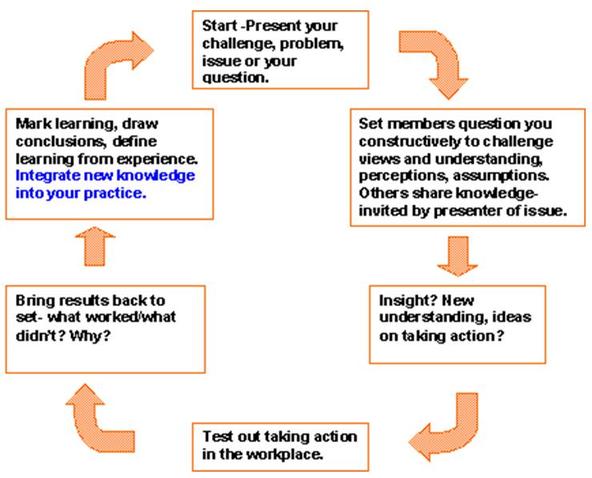Difference between revisions of "Action Learning Sets"
Davide Piga (Talk | contribs) |
Davide Piga (Talk | contribs) |
||
| Line 35: | Line 35: | ||
|knows=Johannes Schunter | |knows=Johannes Schunter | ||
|knows nonmember=mmm | |knows nonmember=mmm | ||
| + | }} | ||
| + | {{Method - Related Method | ||
| + | |related tool=Action Learning Sets | ||
| + | }} | ||
| + | {{Method - Related Method | ||
| + | |related tool=Action Learning Sets | ||
| + | }} | ||
| + | {{Method - Related Discussion | ||
| + | |related discussion=Community Building: how to make people use KS tools | ||
| + | }} | ||
| + | {{Method - Related Discussion | ||
| + | |related discussion=How Monitoring can address learning needs | ||
}} | }} | ||
{{Discussion - Related Discussion | {{Discussion - Related Discussion | ||
Revision as of 14:07, 22 February 2018
|
| |||||||||||
Contents
Brief Description
Action Learning (AL) is a powerful approach for working on difficult problems in professional practice and helps set standards for good practice in organizational learning.
AL sets are **structured mechanisms for working in small groups** to address complicated issues.
The groups or teams are made up of between **six and eight people** who meet together regularly over a reasonable time period and ‘present’ and collectively work on problems faced in ongoing practice.
The Action Learning process is a cyclical one, giving each member the opportunity to present a problem and comment on others.
When to use
They are most often used while undertaking a task, activity, or project, including the design of a project or activity before it happens.
You can use Action Learning Sets with members of your project or program team or with colleagues in other organizations. The key is everyone's commitment to meeting regularly for ongoing learning, support, and professional development.
How to use
This approach offers participants an opportunity for personal development; it improves problem solving and questioning / listening skills; it helps participants tackle complex tasks; it allows participants to learn from other organizations facing similar challenges.
Resources
- ODI Toolkit, Rapid Research and Policy Development, Tools for Knowledge and Learning, 2006
- [Info Sheet by FAO]
- FAO IMARK module “Knowledge sharing for development"
- http://www.fao.org/elearning/#/elc/en/course/EXCAP
Contributors and Resource Persons
The following people contributed to this page:
MariaGrazia Rocchigiani (MariaGrazia.Rocchigiani [at] fao.org)
The following people can tell you more about this method:
mmm
Related Content from the KM4Dev Wiki
- Discussion: How Monitoring can address learning needs
- Knowledge Sharing around water management innovations in the Andes and Himalayas (19 August 2013)
- How Monitoring can address learning needs (3 November 2008)
